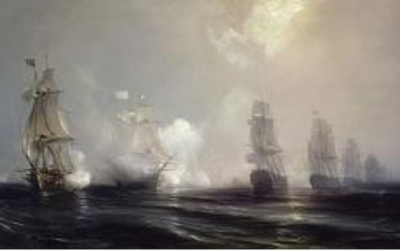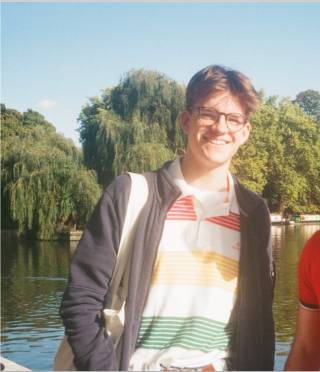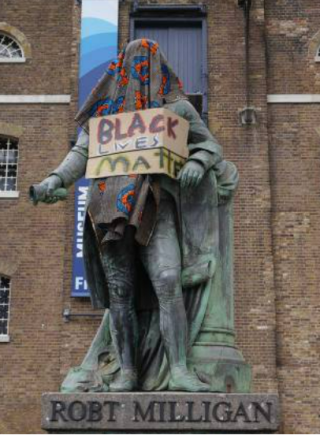UCL History Laidlaw Scholars have the drive and talent to become one of the leaders of the future. They are first year undergraduate students who undertake research with our academic staff on questions of global significance.
We currently have three Laidlaw Scholars, Chris, Patrick and Arya, undertaking exciting research.
If you are interested in becoming a Laidlaw Scholar, the application process is now open.
Patrick Gale

Combat naval devant la Chesapeake, 3 September 1781 (Théodore Gudin, Public domain, via Wikimedia Commons)
My paper argues that, during the war, the British state bore the weight of an ever-increasing national debt, making it increasingly difficult for it to secure the wherewithal needed to finance the conflict. Illicit practices, such as smuggling, compounded the issue of raising revenue; the state had little choice but to rely on more generally applicable taxes to compensate for ballooning wartime costs. To make matters worse, the British state found itself encumbered by a bureaucracy unprepared for fighting a war some five thousand kilometres from the British Isles.
My research project exposed me to primary source material before my second year, giving me a good taste of what I can expect in the future. I wholeheartedly encourage those interested in improving their skills as a historian to apply to become a Laidlaw Scholar. You will not regret it!
Read Patrick's article 'The British Fiscal-Military State During the American War of Independence'

Initially under the supervision of Dr Aaron Graham (1986-2023) and currently under Dr Peter Gordon, Department of History, UCL
In summer 2023 I started working on my research project. My case study is part of the Recognition and Reparation in Philanthropy project, funded by the Rockefeller Foundation and implemented by the UCL History Department. The project considers how philanthropic and other institutions can address the tensions arising from recognition of ‘historical harms’. These include acquisition of wealth generated through the trade in enslaved people, or through particularly aggressive accumulative or extractive practices. More recent harms include promotion of ideas and interventions that have been discredited or considered coercive and morally unacceptable.
The overall goal of the project is, through key informant interviews, mini-case studies and review of relevant documentation, to produce a ‘toolkit’ of principles and possible actions, grounded in historical scholarship, that can assist organisations in navigating these sensitive issues in ways that are both constructive and reparative.
My project investigated a 2022 high-profile legal ruling relating to the (ultimately unsuccessful) attempt to remove from display in the chapel of Jesus College Cambridge, a memorial plaque for college benefactor Tobias Rustat (1608-94), on the grounds of his involvement in the trade of enslaved people.

'Statue of Robert Milligan outside the Museum of London Docklands, 9 June 2020'. Taken by Chis McKenna, reused under Creative Commons license
The investigation focuses on the extent to which history (as both discipline and profession) informs contemporary debates about recognition and reparation practices. The case is of particular significance because of the involvement of academic historians as expert witnesses. Through analysis of local, national and international media coverage, the case study explores the accuracy of reporting of historical fact and the perception of, and value attached to, the expert witness reports. The study thus sheds light on the broader role played by historical scholarship in contributing to perceptions of the Rustat case in particular, and questions of recognition and reparation more broadly.
I encourage anyone who is interested in this project to apply through the Laidlaw Scholarship Programme for Summer 2024. It was a fantastic experience and I greatly look forward to the ‘Leadership in Action’ phase in summer 2024.
 Close
Close

